SPECIAL REPORT : Part 369
By Shamindra
Ferdinando
Field Marshal Sarath Fonseka last Wednesday (19) explained why the Tamil electorate voted for him at the January 26, 2010, presidential election. The explanation coincided with the low-key 12th anniversary of Sri Lanka’s triumph over the Liberation Tigers of Tamil Eelam (LTTE). In other words, Sri Lanka’s most successful Army Chief emphasized how he won the hearts and minds of the Tamil community.
Fonseka said so in Parliament after Samagi Jana Balavegaya (SJB) and Opposition Leader Sajith Premadasa asked for time on behalf of Fonseka. Premadasa wanted the former minister given time to speak on Sri Lanka’s triumph.
Having thanked the then Defence Secretary Gotabaya Rajapaksa (now President), the then President Mahinda Rajapaksa (now Prime Minister) and other services and the Police as well as the Civil Defence Force (CDF), Gampaha District lawmaker Fonseka declared: THE PEOPLE OF THE NORTH AND EAST VOTED FOR HIM WITHOUT HATRED BECAUSE OF THE RESTORATION OF PEACE IN THE ENTIRE COUNTRY.
Why did MP Fonseka make such an assertion 12 years after the war? What prompted him to say so? Most importantly, was he telling the truth? Did the Tamil electorate really vote for him because of his role in the eradication of the LTTE? Lawmakers haven’t responded to Fonseka so far. The civil society, too, has remained mum.
Let me discuss the post-war national reconciliation process, taking into consideration three statements made in Parliament on May 18th (Premier Mahinda Rajapaksa) and on May 19th and 20th (Sarath Fonseka). Having declared that those who spearheaded the war against the LTTE never followed genocidal strategies, Premier Rajapaksa thanked the war time service commanders. Twice President Rajapaksa mentioned Field Marshal Fonseka first. On the following day, MP Fonseka didn’t mince his words when he appreciated the services rendered by the Rajapaksas. Having thanked the President and the Prime Minister, lawmaker Fonseka claimed why the Tamil community backed him at the 2010 presidential election. MP Fonseka zeroed in on Rear Admiral (retd) Sarath Weerasekera on the next day. MP Fonseka sought to isolate Public Security Minister Weerasekera by declaring that even the Rajapaksas recognized the services by him (Fonseka).
Actually, why did the Tamil community vote for Fonseka whose Army literally eradicated the LTTE militarily in the battlefield in May 2009. The failure on the part of the LTTE rump to regroup since then in spite of unlimited funding sources and a section of the international community backing them is a huge credit to the armed forces as well as the political leadership. Obviously, those who survived the war (including the rehabilitated lot) lost their will to take up arms again having succumbed to the combined security forces onslaught. Fonseka’s Army brought the war to an end following nearly a three-year long relentless campaign. However, that wouldn’t have been possible if not for the significant contributions made by the Navy and the Air Force, in support of the ground offensives, in addition to strategic actions directed at the LTTE. Wasantha Karannagoda and Roshan Goonetileke, received promotions as the Admiral of the Fleet and Marshal of the Air Force, respectively, in recognition of the services rendered during the war.
There hadn’t been a previous instance of Fonseka appreciating the role played by the Navy due to his personal animosity towards Karannagoda during the war and thereafter. Some, however, say that the rivalry between the two actually originated at their alma mater, Ananda College, Colombo, due to both of them being talented and ambitious in their own right. But, Karannagoda, in his memoirs, titled ‘Adhistanaya’, lucidly explains the circumstances leading to the crisis.
Anyway, lawmaker Fonseka’s brief but timely speech delivered on the day his Army brought the war to an end, 12 years ago, should be appreciated.
A calculated risk
Actually, why did the UNP pick Fonseka as the common candidate? In the aftermath of the eradication of the LTTE, in 2009, the UNP had no option but to accept Fonseka as the common candidate, particularly against the backdrop of the war-winning General making covert moves in that direction. The UNP-led Opposition strategy was primarily meant to deprive President Mahinda Rajapaksa the advantage of the unbelievable (in the eyes of the powerful West that insisted on the invincibility of the Tigers in battle) war triumph. There couldn’t have been a better choice than Fonseka though the Opposition leadership quite correctly realized how the inclusion of the LTTE’s sidekick Tamil National Alliance (TNA) in the grouping distanced the Southern electorate. Fonseka, however, remained silent until the last moment.
Fonseka didn’t mince his words when the media, on July 15th 2009, raised the possibility of his entry into active politics. The writer was among those who had been present at the media briefing called by General Fonseka, in his new capacity as the Chief of Defence Staff (CDS) at the Joint Operations Headquarters (JOH) within the Army Headquarters premises. Fonseka declared he would never seek a political career. The war veteran said that he wouldn’t want to lose his popularity within 24 hours by taking to politics. The former Army Chief recalled the fate of his senior colleagues, Major General Lakshman Algama and Major General Janaka Perera, both of whom perished in LTTE suicide attacks on election platforms (Gen Fonseka: Lanka ready for fresh UN commitments, with strap line, CDS rules out political career – The Island, July 16, 2009). The LTTE assassinated Gemunu Watch veteran Algama on Dec 18, 1999 at an election rally in Ja-Ela held in support of UNP Presidential candidate Ranil Wickremesinghe, whereas Commando veteran Perera perished on Oct 06, 2008 in Anuradhapura at an event related with PC polls in which he contested as the Chief Ministerial candidate of the North Central Province.
Nothing could be further from the truth than Fonseka’s recent declaration in Parliament that those living in the northern and eastern regions voted for him because of the restoration of peace therein? The Tamil electorate never accepted Fonseka’s role as the Commander of the Army and repeatedly accused him and his Army of genocide, especially after the crushing defeat of the LTTE.
There cannot be any dispute over that. Having recognized the LTTE as the sole representative of the Tamil speaking people, way back in 2001, the TNA wouldn’t have accepted Fonseka if the outfit wasn’t convinced that only the former Army Commander could have challenged the immensely popular Mahinda Rajapaksa at that time.
The plan received the wholehearted backing of the West and especially the US, though the then US Ambassador in Colombo, Patricia Butenis, in a confidential dispatch from Colombo, subsequently exposed by Wikileaks, categorized Fonseka as a war criminal along with President Mahinda Rajapaksa, Defence Secretary Gotabaya Rajapaksa and lawmaker Basil Rajapaksa. The diplomatic missive, dated January 15, 2009, held the above-mentioned leaders responsible for war crimes. In spite of that, the US threw its weight behind Fonseka, perhaps initiating the move itself as the only viable political strategy to defeat the hugely popular war, winning Mahinda Rajapaksa securing a second term.
Neelakandan’s dilemma
It would be pertinent to mention what the then President of the All Ceylon Hindu Congress (ACHC) late lawyer Kandiah Neelakandan told the writer during a visit to Cheddikulam, Vavuniya, on January 09, 2010, organized on the instructions of the then Justice and Law Reforms Minister Milinda Moragoda. Among those who had been present were one-time Bank of Ceylon Chairman Rajan Asirvatham, a member of the government negotiating team for talks with the LTTE in 1994-1995 and Gamini Godakanda on Minister Moragoda’s staff. The visit coincided with President Rajapaksa’s releasing a group of rehabilitated ex-LTTE cadres at Cheddikulam. Asked how he felt the TNA joining the UNP-led alliance backing Fonseka’s candidature at the presidential election, Neelakandan confided that the Tamil community had been asked to vote for the man who conducted the actual war in a bid to defeat the one who gave that directive. Neelakandan confessed that the Tamil community was in a deepening dilemma. Moragoda, now our High Commissioner to India, secured the assistance of the ACHC and other like-minded persons as part of the overall efforts to win the confidence of the Tamil community (Have faith in me – President tells ex-LTTE combatants, The Island, January 10, 2010). President Rajapaksa visited Vavuniya then just over two weeks before the presidential election with him contesting for a second term.
But, obviously, the Tamil community knew what the TNA expected of them. The TNA declared its support for Fonseka’s candidature and the northern and eastern provinces responded accordingly. Fonseka comfortably won all northern and eastern districts though the South delivered a massive blow to the war-winning Army Chief. The then incumbent President defeated Fonseka by over 1.8 mn votes. The US-approved political strategy failed. The failed project caused catastrophe. In fact, the disintegration of the once powerful party, the UNP, began with the disastrous 2010 project. Perhaps, in its haste to bring the Rajapaksa era to an end, the grand old party gambled and gambled badly. What really went wrong? The UNP paid a huge price for not sincerely backing the war effort (August 2006-May 2009) and then exploiting differences between the Rajapaksas and Gen. Fonseka. A political alliance involving the Illankai Thamil Arasu Kadchi-led TNA, tainted by its murderous relationship with the LTTE, at the 2010 presidential election, boomeranged. The UNP and even General Fonseka ignored how the LTTE-TNA coalition at the 2005 presidential election ensured UNP candidate Ranil Wickremesinghe’s defeat. If not for the LTTE-TNA prevailing on Tamils not to vote for Wickremesinghe, the UNP Leader would have won the election hands down.
Wickremesinghe contested the 2005 presidential election on the UNP ticket. A UNP-led coalition fielded presidential candidates on the New Democratic Front (NDF/symbol swan) at the 2010 (General Sarath Fonseka) 2015 (Maithripala Sirisena) and 2019 (Sajith Premadasa). Having engineered Wickremesinghe’s defeat at the 2005 presidential poll, the TNA backed candidates fielded by the UNP at the following three elections. The UNP suffered avoidable defeats due to its involvement with the TNA. The UK headquartered Global Tamil Forum (GTF) affiliated with the TNA, too, played politics with the government. The GTF had access to President Maithripala Sirisena during his first visit to the UK following the 2015 presidential election.
A statement issued by the influential Global Tamil Forum (GTF) to mark the 12th anniversary of the conclusion of the war revealed their strategies remained the same though the LTTE was no longer around. In spite of the TNA gradually losing its clout and the emergence of other political parties, the GTF seems pursuing the same strategy. Let me reproduce verbatim the relevant section of the GTF statement issued by Suren Surendiran: “Equally important is that the Tamil people and their leaders take stock of the challenges and opportunities in the present political climate and act strategically by forming partnerships with stakeholders across all communities in Sri Lanka and in the international community. The importance and urgency of securing pragmatic and tangible gains, with the objective of fulfilling the political and economic aspirations of the Tamil people, cannot be overstated.”
The UNP’s plight
If General Fonseka is genuine in his assessment that the Tamil community voted for him at the 2010 presidential election in appreciation for restoration of peace, why on earth the TNA pushed for an international war crimes probe. Fonseka cannot be unaware 13 Tamil lawmakers, including those who backed him at the 2010 presidential poll, sought international intervention at the 46th session of the Geneva-based United Nations Human Rights Council (UNHRC) in Feb-March this year. Perhaps Fonseka should seek an explanation from Tamil political parties in the Opposition why they pursued a war crimes probe against the backdrop of the Tamil electorate voting for him. That of course is only if Field Marshal is genuine in his May 19 assessment.
The UNP’s post-war strategy caused the deterioration of the party. The UNP/President Sirisena stratagem in accepting the TNA as the main Opposition party in Parliament with the connivance of then Speaker Karu Jayasuriya during the yahapalana administration at the expense of the Joint Opposition which commanded the support of much more MPs, elected on the UPFA ticket, at the 2015 general election, caused irreversible setback to the UNP in the eyes of the public. Unprecedented split in the UNP in the run-up to the last parliamentary election in August 2020 made matters worse for the party. Fonseka was among those who switched allegiance to the SJB. The badly depleted UNP, for the first time in its history, failed to win a single seat. The party ended up with just one National seat. Over eight months after the election, that seat remains vacant primarily because of the vacillation of its Leader and his stubbornness in holding onto the party leadership despite numerous polls defeats under his watch. The leadership is like an heirloom that he has inherited.
Why Fonseka accepted the TNA’s backing against the backdrop of its close relationship with the LTTE is a mystery. Having recalled the killing of Majors General Algama and Perera when he assumed duties as the CDS in July 2009, Fonseka quite conveniently forgot the TNA’s endorsement of the LTTE bid to assassinate Fonseka. If the LTTE succeeded in eliminating Fonseka in April 2006 and Defence Secretary Gotabaya Rajapaksa in Oct 2006, the war would have definitely taken a different turn as we have often reminded.
The recent passage of a Bill 104 in the Ontario Provincial Legislature that recognized that the Tamil community in Sri Lanka was subjected to genocide is a reminder of the growing threat posed by a section of the international community even though many of those powerful Western nations which are instigating the Tamil Diaspora have much blood in their own hands-leaving aside their recent grave criminal acts as in the Middle East, countries like the USA, Canada, Australia were created after committing many acts of genocide against natives of those lands. We also cannot forget the unforgivable crimes that have been committed against Negroes in the last five hundred years or more. They demanded and got compensation for Jews, but have they at least given even a proper apology for the grievous crimes committed against gypsies and blacks that they continue to perpetrate. It is as if not a week goes by in the USA without the extrajudicial gunning down of a black in the streets of that country by its law enforcers. Prior to 2020 the so called independent free media simply ignored such killings of blacks and other minorities running to hundreds each year. But last year as they wanted to target Trump the media suddenly picked up the Black Livers Matter cry, especially to get at right wing perpetrators of such crimes and their sympathisers in the Trump camp.
Field Marshal Fonseka represents the people in Parliament. Having commanded the successful Army, lawmaker Fonseka cannot under any circumstances play politics with the issue at hand. Parliament, too, as an institution should recognize high profile threatening Canadian project and how it could influence other countries and strengthen the ongoing Geneva inquiry.
Field Marshal Fonseka’s declaration that the Tamil community voted for him for the restoration of peace cannot certainly be accurate. Re-assessment of the ground situation is of pivotal importance as interested parties brazenly exploit the utterly corrupt political party system. The GTF’s advice to the Tamil speaking community and their leaders regarding political strategies is evidence of how the project is pursued. The bottom line is that those who once believed in the conventional fighting capability of the LTTE seem confident their political objectives could be achieved through constitutional means. They have the backing of the Western powers. Western backing for candidature like General Sarath Fonseka and Maithripala Sirisena at the 2010 and 2015 presidential polls, respectively underscored their strategy. Both the UNP and the SLFP paid a huge price for giving into the Western initiatives. At the end both political parties suffered irreversible setbacks. Who would have thought the birth of SJB and SLPP at the expense of the UNP and the SLFP, respectively? Today, both parties are in a sorry state with no hope in sight of a comeback.
The UNP seeking to bring the Mahinda Rajapaksa era to an end fielded Fonseka. For the UNP, it didn’t matter whether their presidential candidate was able at least to exercise his franchise. The then General’s inability to vote for want of him being registered as a voter was known only on the election day. Obviously the electorate was deceived. Having suffered a humiliating defeat, the UNP-led coalition, foolishly propagated the lie that the former Army Commander was defeated through what the losers called a computer jilmaart (manipulation). The JVP literally ran with the computer jilmaart lie. Today, the JVP has been reduced to three lawmakers in Parliament. Their group includes one National List MP (Dr. Harini Amarasuriya). At the height of its parliamentary power, the JVP group comprised 39 members of Parliament elected in 2004, including three National List members. In fact, all political parties involved in the 2010 coalition established to back Fonseka are in turmoil. The UNP has been reduced to one National List MP, the TNA to 10 and JVP three with two other constituents, the SLMC and the ALCM reduced to five and four members respectively. Perhaps a fresh look at political landscape is necessary against the backdrop of the passage of the Colombo Port City Economic Commission Bill.
We apologise to the readers for not touching on the burning topic plaguing the country, the coronavirus pandemic. We felt the readers need a break from the subject as the media is replete with the subject, day and night.

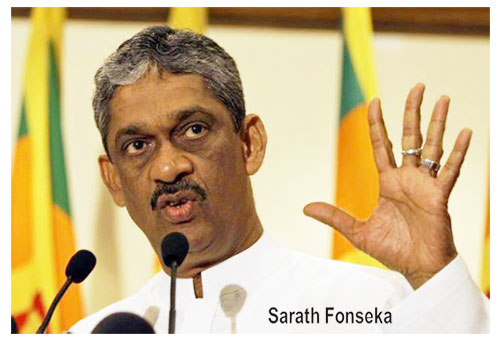
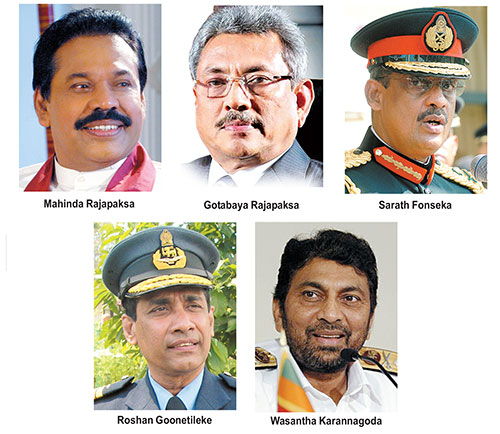
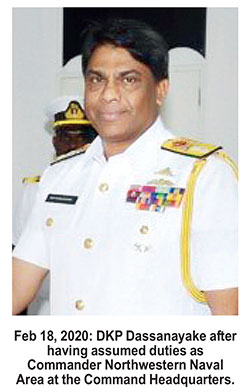 Fonseka’s unexpected entry into politics, in 2009 with the backing of a UNP-led alliance, weakened the country’s defence against war crimes accusations. By switching his allegiance to the new coalition, that included the LTTE political wing, the TNA, Fonseka undermined the country’s defence and after quite a turbulent political career has ended up with the breakaway UNP faction, the SJB.
Fonseka’s unexpected entry into politics, in 2009 with the backing of a UNP-led alliance, weakened the country’s defence against war crimes accusations. By switching his allegiance to the new coalition, that included the LTTE political wing, the TNA, Fonseka undermined the country’s defence and after quite a turbulent political career has ended up with the breakaway UNP faction, the SJB.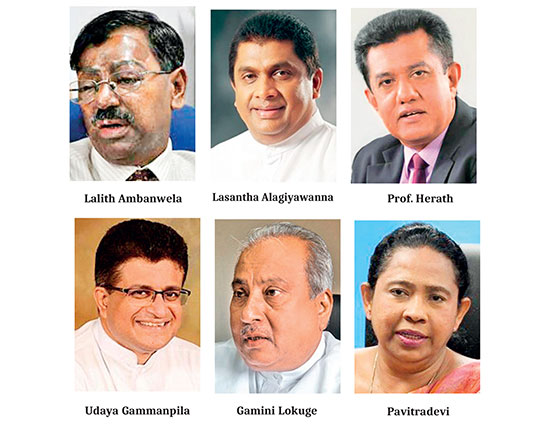
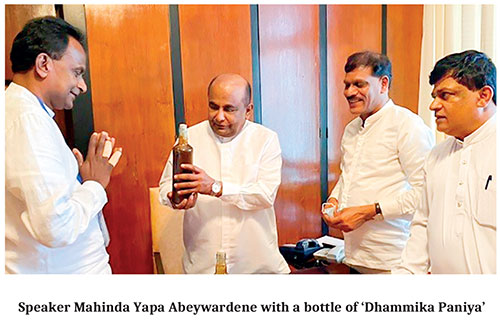 The last presidential election was conducted in Nov 2019. The parliamentary election followed in August 2020. The electorate overwhelmingly voted for the SLPP, in both instances, with the SLPP securing a staggering 145 seats – just five short of a two-thirds majority. Without doubt, the SLPP’s performance is the best since the introduction of the Proportional Representation (PR) system. The UNP obtained 5/6 of the seats at the 1977 general election under the first-past-the-post system. As lawmaker Gammanpila called for public proposals as regards a grading system for ministers, perhaps it would be pertinent to rank governments/political parties on the basis of points scored by ministers and members of Parliament in terms of a grading system. In other words, a proper grading system should reflect genuine public opinion.
The last presidential election was conducted in Nov 2019. The parliamentary election followed in August 2020. The electorate overwhelmingly voted for the SLPP, in both instances, with the SLPP securing a staggering 145 seats – just five short of a two-thirds majority. Without doubt, the SLPP’s performance is the best since the introduction of the Proportional Representation (PR) system. The UNP obtained 5/6 of the seats at the 1977 general election under the first-past-the-post system. As lawmaker Gammanpila called for public proposals as regards a grading system for ministers, perhaps it would be pertinent to rank governments/political parties on the basis of points scored by ministers and members of Parliament in terms of a grading system. In other words, a proper grading system should reflect genuine public opinion.